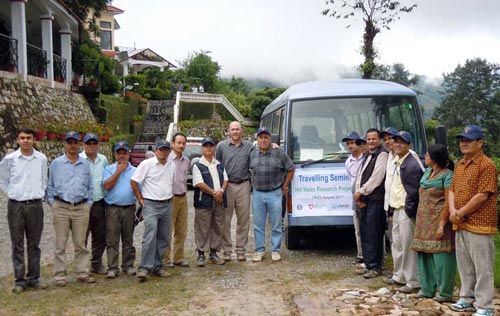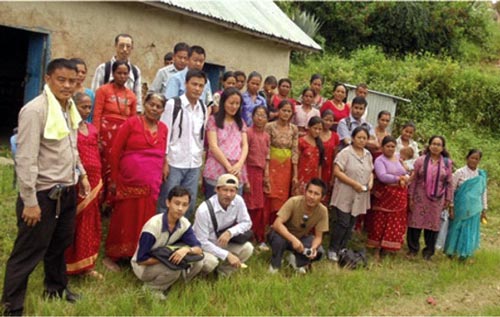 During 19-21 August 2011, a travelling seminar on “Maize Research and Development in the Hills of Nepal” was organized by the CIMMYT-led Hill Maize Research Project (HMRP), Nepal Agricultural Research Council (NARC), and the Nepal Department of Agriculture (DoA). The seminar offered policy makers first-hand information on maize varietal development, seed multiplication, technology dissemination, and HMRP’s efforts to improve food security and livelihoods of small-scale and disadvantaged farmers in the region. The 25 participants included representatives from the National Planning Commission, Ministry of Agriculture and Cooperatives, National Seed Board, NARC, DoA, donors (SDC and USAID), and NGOs.
During 19-21 August 2011, a travelling seminar on “Maize Research and Development in the Hills of Nepal” was organized by the CIMMYT-led Hill Maize Research Project (HMRP), Nepal Agricultural Research Council (NARC), and the Nepal Department of Agriculture (DoA). The seminar offered policy makers first-hand information on maize varietal development, seed multiplication, technology dissemination, and HMRP’s efforts to improve food security and livelihoods of small-scale and disadvantaged farmers in the region. The 25 participants included representatives from the National Planning Commission, Ministry of Agriculture and Cooperatives, National Seed Board, NARC, DoA, donors (SDC and USAID), and NGOs.
The first day included visits to participatory variety selection (PVS) and community-based seed production (CBSP) sites, and women’s CBSP cooperatives in Fulbari and Buluwa villages, 60km east of Kathmandu in the Kavre district. HMRP Leader, Guillermo Ortiz-Ferrara, described the work of HMRP, highlighting the increasing role of CBSP groups and the private sector in seed production and marketing, participation of multi-stakeholders, focus on gender equity and social inclusion, and continuation of farmers’ participatory adaptive research, including maize germplasm introduction and testing. Nanu Ghatani, Chairperson of the cooperatives, was one of the 45 members of the women’s cooperative and farmers who gathered to welcome the participants. She described the accomplishments of the CBSP cooperatives and their impact on enhancing food security; since the introduction of the new maize varieties and improved crop management technologies “maize yield has been doubled, and by selling improved seed, farmers could fetch NRs 35/Kg in 2010, when the price of maize grain was NRs 17/Kg. In value terms our land has been tripled,” she said. This has enabled women farmers to substantially increase their savings, she added. USAID representative Kip Sutton commended HMRP and partners for reducing poverty and food insecurity in the area, but participants also learned that there are further needs to improve yields, storage facilities, credits, inputs, and training.
 The following day featured a visit to the Hill Crop Research Program (HCRP), Kabre, Dolakha. Participants observed the onsite maize research and development activities, such as source seed production of improved maize varieties, and had the opportunity to interact with scientists at the station. N.P. Adhikari, Director of Crops and Horticulture, NARC, and D.B. Gurung, National Maize Coordinator, complimented the scientists for their accomplishments in maize research and development, both at the station and in the field.
The following day featured a visit to the Hill Crop Research Program (HCRP), Kabre, Dolakha. Participants observed the onsite maize research and development activities, such as source seed production of improved maize varieties, and had the opportunity to interact with scientists at the station. N.P. Adhikari, Director of Crops and Horticulture, NARC, and D.B. Gurung, National Maize Coordinator, complimented the scientists for their accomplishments in maize research and development, both at the station and in the field.
Station Chief, K.B. Koirala, gave a presentation on “Present status, priority, and challenges of maize research and seed production in HCRP Kabre”, highlighting that the work of the station has improved maize source seed production and quality, and reached thousands of poor farmers in the target area. The team then visited one of the farm cooperatives, which is conducting maize CBSP on 7ha. In later feedback, Adhikari commented that the seminar provided experiences which could only be appreciated by observations at the field level.
On the final day, participants visited the Hariyali Seed Company, a community-managed private seed company promoted by HMRP in Sindhupalchowk district. Company Coordinator, D.B. Bhandari, and the President of Sindhu-Tuki Seed Producers’ Cooperative, Gunda Bahadur Thami, outlined the progress of the cooperative so far; from the first maize PVS and intercropping trials in 2004, to the formation of a CBSP group in 2005, transformation into a cooperative in 2008, and culminating in the formation of the community-owned seed company in 2010, with maize seed being multiplied in 50ha.
The feedback from participants was very positive, with Bharat Upadhyaya, Executive Director of Nepal’s Center for Environmental and Agricultural Policy Research, Extension, and Development, commenting that “my 30 years of professional career in agriculture development in Nepal would have been incomplete if I would have missed this visit.” It was suggested that the event should be conducted annually during the main maize season.
 Capacity development
Capacity development 
